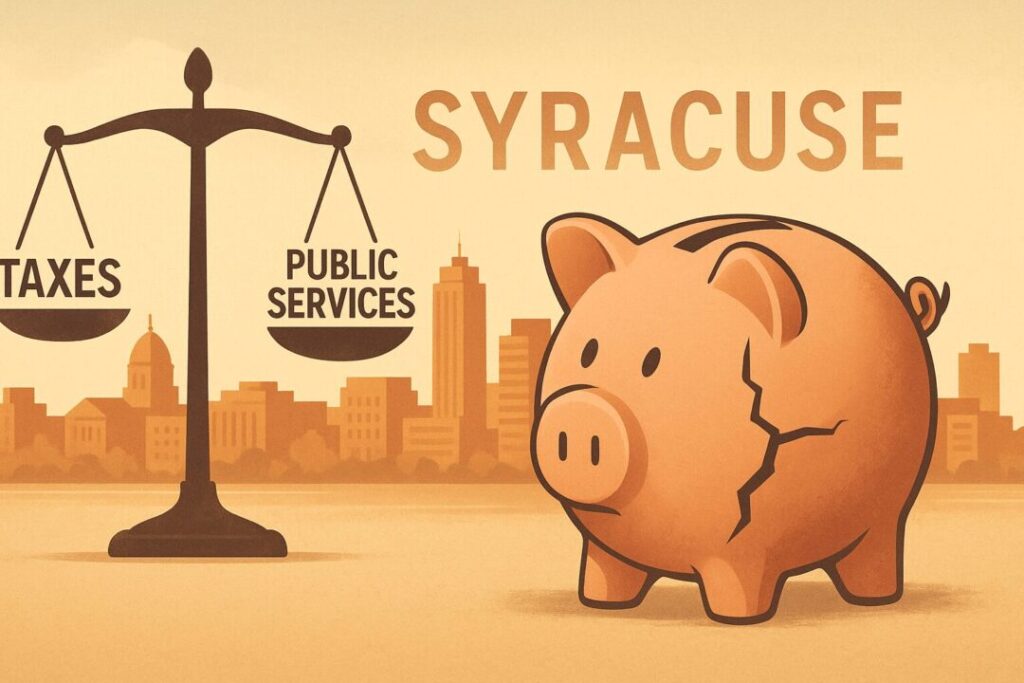Syracuse, New York, is facing a $16 million budget shortfall, and the way its leaders handled it offers a lesson every city (Nevada towns included) can learn from.
The city’s Common Council decided not to raise property taxes and instead cut spending. That’s the kind of fiscal discipline we like to see: holding the line on taxes and keeping government from dipping too deep into reserve funds.
Mayor Ben Walsh wanted to plug the hole by raising property taxes 2% and using $27 million from the city’s reserves. The Council overrode him. They voted to keep taxes flat and reduce the reserve drawdown to $14 million.
Acting Council President Pat Hogan put it simply: the city needs a healthy savings account to avoid a financial crisis later.
That’s a principle that rings true for any household or business – and it’s exactly how government should think about taxpayer money.
The Good and the Bad
Cutting $16 million means someone is getting the short end of the stick.
According to the Washington Post, the cuts include trash collection, road repairs, housing inspections, public pools, and even public safety tools like ShotSpotter, a gunshot detection system that helps police respond faster to shootings.
So here’s the dilemma: yes, we want smaller government and less waste. But we also believe in keeping streets safe, roads in good shape, and neighborhoods clean.
If cuts go too deep into these core services, it can hurt the very communities we want to strengthen.
In Syracuse’s poorest neighborhoods, fewer housing inspections could mean more unsafe rental units. Less trash pickup could lead to blight. And without ShotSpotter, police might lose valuable response time when shots are fired.
A Question of Process
Mayor Walsh blasted the Council for rushing the changes. He said over half of their 81 budget amendments were pushed through without public discussion or input from department heads.
Conservatives should take that criticism seriously. Transparency and good process matter. If voters can’t see how decisions are made, trust in government drops—no matter how good the intentions.
Walsh tried to restore $13 million in funding through vetoes, but the Council stood firm.
From one side’s perspective, that’s admirable backbone against bigger government. From the other, it shows a lack of willingness to meet in the middle.
The Role of the Auditor
The Council leaned on a report from an outside auditor to justify their cuts.
Conservatives like the idea of data-driven decisions and an outside check on government spending, but in this case, the audit was put together in just 15 days and without talking to the departments being cut.
That raises eyebrows. If the numbers aren’t solid, you risk making the wrong cuts.
Hogan says departments can come back and ask for more money later if needed. That could be seen as enforcing accountability; don’t ask for more until you prove you need it. Mayor Walsh, on the other hand, says it disrupts planning and makes it harder to run the city effectively.
Why Nevada Should Care
Nevada cities (especially fast-growing ones like Las Vegas, Henderson, and Reno) will face similar debates as budgets tighten.
The Syracuse example shows it’s not an easy call.
Fiscal discipline matters. So does protecting public safety and keeping our communities strong.
The challenge for conservative leaders is finding a balance that does both.
The opinions expressed by contributors are their own and do not necessarily represent the views of Nevada News & Views. This article was written with the assistance of AI. Please verify information and consult additional sources as needed.




